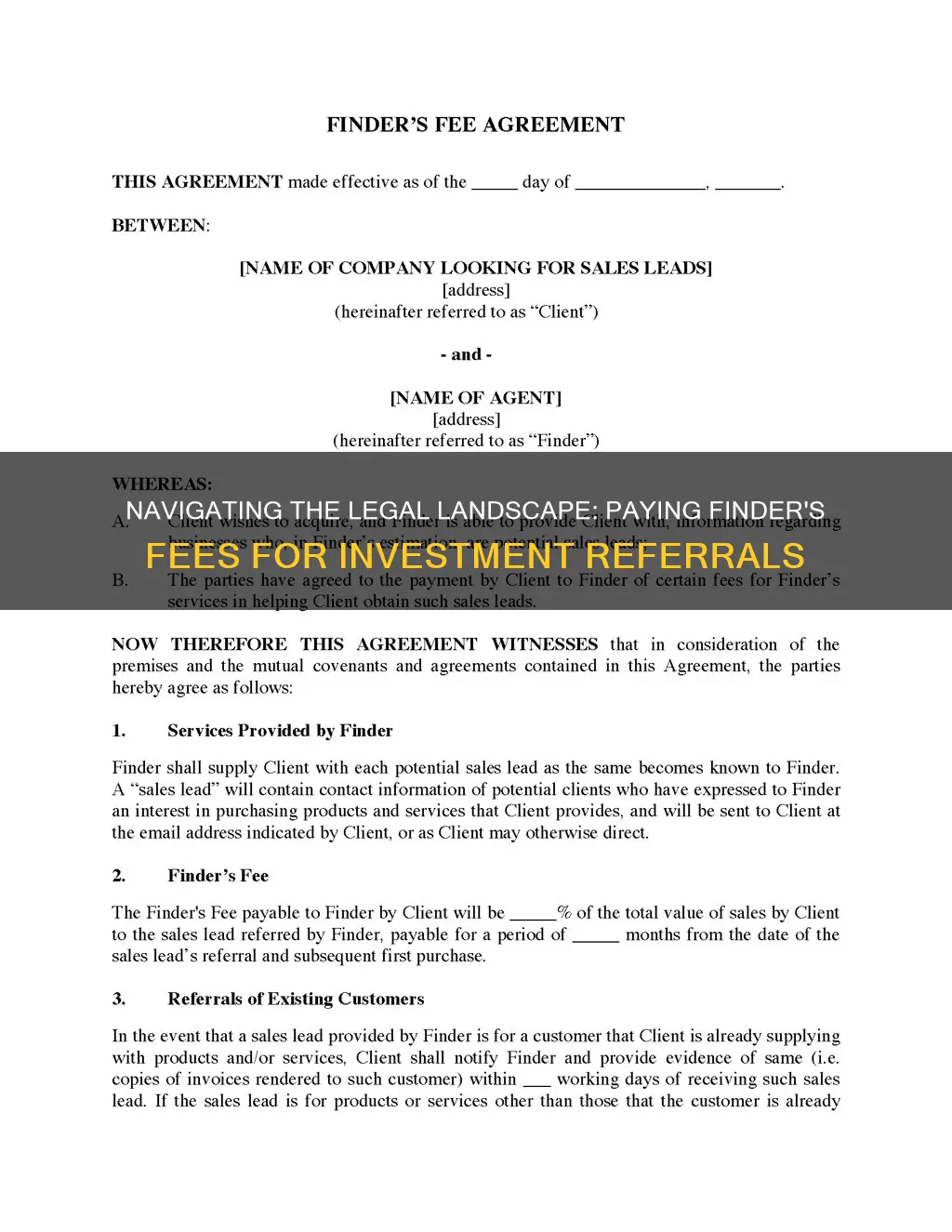
A finder's fee is a commission paid to an intermediary who facilitates a transaction. In the context of investment referrals, a finder's fee is typically paid to someone who connects a business with potential investors. While finder's fees are not legally required and are often simply gifts, they can be an effective way to incentivise referrals and reward intermediaries for their role in sourcing deals and bringing them to interested parties. However, it is important to note that there are legal considerations, especially regarding securities transactions and broker-dealer registration requirements.
| Characteristics | Values |
|---|---|
| Legally Binding | No |
| Required | No |
| Typical Fee | 5-15% of deal value |
| Who Pays | Buyer or seller |
| Who Receives | Intermediary/facilitator |
| When Paid | When the deal is finalised |
| Contract Required | No |
What You'll Learn

State and federal securities laws
At the federal level, Section 15(a) of the Securities Exchange Act of 1934 requires persons engaged in broker or dealer activity to register with the SEC pursuant to Section 15(b) of the Exchange Act. The SEC takes an "expansive" view of what constitutes "broker-dealer" activity, which includes soliciting investors, assisting in structuring securities transactions, helping identify potential investors, participating in deal negotiations, and handling investment funds or securities.
The SEC is particularly focused on the nature of any compensation paid to "non-registered" persons. Transaction-based or success-based compensation, such as payments based on amounts invested or on closing above a certain amount, can trigger a violation of Section 15, even if the person receiving compensation is not engaged in other broker-dealer activities.
Violations of Section 15 can result in significant legal and financial consequences, including direct liability for finders in the form of injunctive actions, fines, and even criminal prosecution in the case of willful violations. Companies paying finders can also face aiding and abetting liability and be held directly liable for causing violations of Section 15(a).
To comply with Section 15, it is advisable to use registered broker-dealers as finders. When non-broker-dealer finders are used, the risks of violating Section 15 can be mitigated by avoiding compensation arrangements tied to deal success or investment amounts and ensuring that finders do no more than make initial introductions.
Moderna: Invest Now or Never?
You may want to see also

Broker-dealer registration requirements
According to the U.S. Securities and Exchange Commission (SEC), "brokers" and "dealers" must register with the SEC and join a "self-regulatory organization" (SRO). The SEC defines a "broker" as:
> any person engaged in the business of effecting transactions in securities for the account of others.
The definition of a "dealer" is:
> any person engaged in the business of buying and selling securities for his own account, through a broker or otherwise.
The SEC provides a list of individuals and businesses that may need to register as a broker, including:
- "Finders," "business brokers," and other entities that engage in specific activities, such as finding investors or customers for registered broker-dealers or making referrals.
- Investment advisers and financial consultants.
- Persons that market real-estate investment interests.
- Persons that act as "placement agents" for private placements of securities.
To determine whether an individual or entity is a broker, the SEC considers factors such as whether they participate in important parts of a securities transaction, whether their compensation is related to the outcome or size of the transaction, and whether they handle the securities or funds of others in connection with securities transactions.
The SEC also outlines specific requirements for broker-dealer registration, including:
- Filing Form BD and obtaining SEC registration.
- Becoming a member of an SRO, such as the Financial Industry Regulatory Authority (FINRA) or a registered national securities exchange.
- Becoming a member of the Securities Investor Protection Corporation (SIPC).
- Complying with state requirements, including registration with each state in which the broker-dealer plans to do business.
- Ensuring that "associated persons" satisfy applicable qualification requirements, such as passing an SRO securities qualification examination.
It is important to note that broker-dealers must also comply with various conduct regulations, such as anti-fraud provisions, suitability requirements, and privacy protection rules. Additionally, they must meet certain financial responsibility requirements, including maintaining minimum amounts of liquid assets and safeguarding customer funds and securities.
Investing 101: Post-College Edition
You may want to see also

When to pay a finder's fee
A finder's fee is a payment made to an intermediary who brings parties together for a transaction. The intermediary is rewarded because their involvement was necessary for the deal to take place. Finder's fees are usually paid by the company that was referred to.
Finder's fees are typically paid when someone plays a role in helping another person transact business. This could include finding new leads through social media, word-of-mouth referrals, or cold calls. In the case of investment referrals, a finder's fee can be paid when someone facilitates an introduction to a potential investor.
The timing of the payment of a finder's fee can vary depending on the industry and the specifics of the deal. In some cases, a finder's fee might be a one-time payment, while in other cases, it may extend for a longer period, with the 'finder' benefiting from the long-term success of the new customer. It is important to note that the payment of a finder's fee is not always legally required and is often considered a gift or form of incentive.
When determining the timing of a finder's fee payment, it is crucial to consider the size of the deal, the level of involvement of the intermediary, and the industry standards for finder's fees. For example, in the consulting industry, a finder's fee of 5-15% is common, while in investments, it is typically 4-5% of the investment brought in.
It is also important to note that there may be legal and regulatory considerations when paying a finder's fee, especially in the context of private lending and securities transactions. In the United States, certain activities related to facilitating securities transactions may be classified as broker-dealer activities, which require registration with the Securities and Exchange Commission (SEC). Therefore, it is essential to seek legal advice to ensure compliance with applicable laws and regulations.
SEO Investment: When to Take the Plunge?
You may want to see also

Real estate referrals
A finder's fee, also known as a referral fee or referral income, is a payment made to an intermediary who facilitates a transaction. In real estate, this often refers to the payment of a commission to a middleman of some kind for brokering a deal.
In the context of real estate, finder's fees are typically paid by real estate agents or brokers, rather than investors directly. However, commercial real estate transactions will almost always involve the payment of at least one finder's fee. Finder's fees in real estate are commonplace but regulated by law.
For instance, the Real Estate Settlements and Procedures Act (RESPA), passed by Congress in 1974, prohibits the payment of referral fees to unlicensed persons in most cases. This law was put in place to prevent illegal and abusive practices in the industry. Most states have laws that allow intermediaries to request a percentage of the deal's value, typically ranging from 3% to 35%.
It is important to note that finder's fees are not legally required, and there is no standard or prescribed amount. They are simply a practice in the industry, and nobody is legally entitled to such payments. Finder's fees are usually paid between brokers, and real estate agents draw up Cooperating Agreements to streamline the referral and payment process.
Additionally, it is worth mentioning that referral fees should not affect the services provided to clients by real estate agents. Agents have a fiduciary duty to act in their clients' best interests, regardless of whether a referral fee is involved.
In summary, when dealing with real estate referrals and finder's fees, it is crucial to be aware of the relevant laws and regulations, such as the Real Estate Settlements and Procedures Act, and to ensure that all parties involved are licensed and that the referral fee is properly disclosed.
Nike: A Smart Investment Choice?
You may want to see also

Avoiding unlicensed broker-dealers
The Securities and Exchange Commission (SEC) and Financial Industry Regulatory Authority (FINRA) have strict definitions of what constitutes broker-dealer activity. Generally, anyone who "effects transactions in securities or attempts to induce the purchase or sale of securities" must be registered.
The SEC has revealed, through various no-action letters and other guidance, the factors it considers when deciding whether a finder has violated securities laws by failing to register as a broker-dealer.
- Introduce, but don't advise: A finder can introduce investors to issuers without further involvement. However, they must not advise on the investment's structure or suitability.
- Fixed fee, not commission: A finder can receive compensation for making introductions, but it should not be tied to the success of the deal or the amount invested. In other words, it should be a fixed fee rather than a commission.
- No negotiation, structuring, or pre-selling: A finder must not participate in negotiations or help structure transactions. They also must not engage in "pre-selling" by gauging the level of interest in the issuance.
- No transaction administration: A finder should not be involved in the administration of transactions, such as handling securities, cash, or other aspects of securities transactions.
- No investor screening: A finder should not "pre-screen" potential investors to determine their eligibility to purchase securities.
- No investment advice: A finder must not provide advice regarding the value of securities or advise on portfolio allocations to accommodate an investment.
- No confidential information: A finder should not provide potential investors with confidential information identifying other investors and their capital commitments.
- No active investor sourcing: While a finder can make introductions, they should not actively seek out investors.
- No dissemination of materials: A finder should not send private placement memoranda, subscription documents, or due diligence materials to potential investors.
In summary, unlicensed broker-dealers or finders must limit their activities to making simple introductions between investors and issuers. Any form of transaction-based compensation or involvement in deal negotiations and structuring will likely trigger the requirement to register as a broker-dealer.
Smart Places to Invest $30K Today
You may want to see also
Frequently asked questions
A finder's fee is a commission or reward paid to an intermediary who facilitates a transaction by bringing the transacting parties together.
A finder's fee is paid when a transaction is completed with the help of an intermediary. The fee can be paid by either the buyer or the seller in the transaction.
No, a contract is not required as a finder's fee is not legally binding. However, it is recommended to have a contract to ensure all parties are in agreement on the scope of compensation.
A finder's fee can vary depending on the industry and the specifics of the transaction. In most cases, the fee ranges from 5% to 35% of the total value of the deal.
Yes, it is important to note that state and federal securities laws prohibit the payment of finder's fees to non-broker-dealers in securities transactions. This includes individuals who are involved in soliciting investors, structuring transactions, or providing investment advice.







